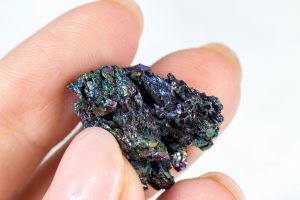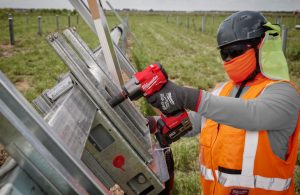3 lessons from Aldi’s switch away from HFCs to natural refrigerant

In theory, if fridges and air conditioning systems are completely sealed, then the gasses inside them will never affect the earth’s atmosphere. But if they escape, these gasses— hydrofluorocarbons (HFCs) — can be tens of thousands of times more potent than carbon dioxide in their effect on global warming.
Escape they do. The average U.S. supermarket leaks up to 25 percent of its refrigerants, according to the Environmental Protection Agency. Refrigeration is responsible for around 10 percent of global CO2 or its equivalent, annually.
New state-level regulations are coming in to force groceries to change. In response, rather than attempting to seal every leak in every store — logistically impossible — the industry is moving away from HFCs entirely. Three retailers, Aldi, Target and Walmart, have made public commitments to end all HFC use by 2035 (Aldi) and 2040 (Target and Walmart).
Aldi is leading the way: It currently has 590 stores using refrigerants with zero or near-zero “Global Warming Potential” (a ranking for chemicals’ potency as pollutants). It is in the process of replacing systems in the remainder of its 2,362 locations in the U.S.
“The goal for our team was to find a way to minimize our carbon emissions and minimize our impacts with our growth and expansion,” said Amber Hardy, director of systems and sustainability at Aldi U.S. “It’s a target. We’re going to work our hardest to make that happen in that timeframe.”
“Aldi has been quite a leader in this field,” confirmed Avispa Mahapatra, the climate campaign director at the Environmental Investigation Agency.
Hardy broke down three insights from Aldi’s transition:
1. Regional issues are the biggest challenge
Salt erosion, high temperatures, humidity and access to the most advanced technology vary from state to state. According to Hardy, it took years for Aldi to find solutions for stores on the coasts where salt damages equipment or in the South where high temperatures complicate operations.
In hot, humid weather a refrigeration system has to work harder to maintain the desired temperature. That results in more energy usage and a greater strain on the equipment, shortening its lifespan. Aldi thus designs dehumidification into its stores to minimize the amount of moisture contacting the system.
Southern markets have less access to advanced technology, Hardy said, and the company had difficulty obtaining CO2 refrigeration machinery in some of these areas. Consequently, Hardy chose not to solely rely on CO2 as a single solution for the South.
“We had to explore some other systems,” she said. “CO2 isn’t ruled out in those regions, but we’re doing a mix of some different propane solutions and some CO2 systems to make sure that we’re not putting all of our eggs in one basket.”
Being flexible and experimenting with various methods is important when attempting to overhaul an entrenched system nationally. In 2021, Aldi remodeled a store in Decatur, Florida, with an all-CO2 refrigeration system — one of the company’s first in a Southern state.
2. Combine retrofits with other construction plans to avoid shutdowns
Upgrading to natural refrigerants requires ripping out the existing infrastructure and replacing it with equipment made for higher pressures. Executives typically balk at the idea of shutting down an entire store for weeks to do this.
Aldi decided to synchronize refrigerator upgrades with other remodels so no extra downtime was added to projects. Hardy also suggested conducting work overnight or doing the construction in a piece-by-piece fashion to minimize disruption.
A retrofit will have a better chance of making it over the finish line if it is linked to another already-planned project. “For us, it’s about prioritizing and trying to tackle the worst stores first,” Hardy said. “Looking at it holistically: What refrigerants do we get rid of first? What stores might have older assets? There’s a lot of strategy.”
3. Be prepared for supply chain hiccups
Supply chain woes have been a persistent feature of the economy since the COVID-19 pandemic. Retailers should expect unexpected shortages, Hardy said. Aldi had the most trouble in markets where natural refrigeration wasn’t yet widely utilized.
Sourcing natural refrigerants wasn’t the major issue. “Ironically one of the hardest things to source was the steel cylinders used for storing the CO2,” Hardy said.
Keeping shortages on your radar, securing a stockpile and planning ahead became critical parts of the plan.
Aldi has nearly 6,000 stores in Europe, where natural refrigeration has already become standard practice, and the institutional knowledge that comes with that. “It’s not a big deal to them anymore,” Hardy said. “Which is really reassuring because that tells me we’re making the right choice. We’re making the long term investment instead of having to do refrigerant phase-outs over and over again. We’re moving to what is the long-term strategic decision.”






